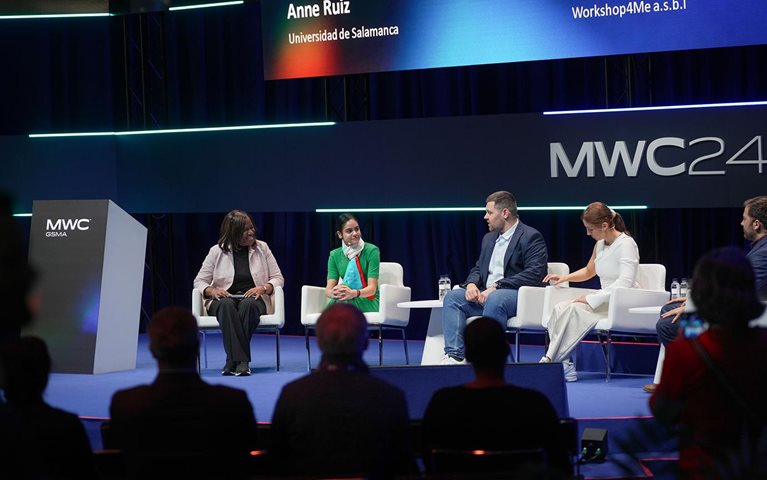Barcelona was buzzing this week as some 100,000 people came in for Mobile World Congress (MWC). Innovators, tech and telecom execs from around the world, policymakers and entrepreneurs gathered to talk about the future of connectivity. The freshest tech was on show—wearable phones that doubled as bracelets; expandable phones with camera lenses; and tri-foldable phones. Not to mention AI-powered sports and robots that served as work partners.
Dozens of McKinsey partners were in the thick of it, leading roundtables, sharing new research, and helping companies navigate some of the biggest shifts in the industry. Three of our experts share their takeaways from the week.
Gen AI: Three lessons learned—and one yet to come

AI is everywhere, but making it work at scale? That’s the hard part. Nearly every telco has experimented with gen AI, mostly in the customer service domain, but fewer have cracked the code on how to move beyond pilots to true transformation.
As most are learning, it’s much more complicated to advance pilot use cases into at-scale capabilities, and even harder to become an “AI-native” company. “This means fundamentally changing the way you operate: redesigning processes; shifting mindsets on a large scale; and securing leadership commitment at the CEO and board level,” explains Tomás Lajous, a McKinsey senior partner and global leader of QuantumBlack Labs, the software development and R&D center of McKinsey’s AI consulting arm. He details three insights from his work this year:
- Businesses have the data. They need to spend the time, effort, and resources to integrate it so that structured and unstructured data can work seamlessly together.
- Don’t chase short-term wins. Focus on cumulative, cross-domain ROI, not just individual business case or tech KPIs.
- AI adoption means real change. Many teams are still doing the tasks AI has already automated. It’s time to redefine roles, upskill employees, and build AI into everyday workflows.
One area Tomás Is very excited, but not hearing much about, is the ability to use gen AI to generate insights that solve seemingly intractable problems. For example, a team working within a legacy infrastructure with multiple circuits that have accumulated over the years may have to do thousands of time-consuming engineering exercises to simplify the architecture.
Gen AI can help to shortcut that. First it can create a sufficiently accurate snapshot of the circuit inventory by synthesizing information from a variety of sources: audio interviews with users; hard copy documents; embedded software code. Additional AI tooling (notable agents) can take engineering plans for different archetypical situations and apply them where appropriate, accelerating the update.
“We're not embedding the agent or implementing an AI pilot or training a model. We're simply using AI to derive insights to correct seemingly intractable “one-off” problems,” he says. “Think of the scale of effectiveness this can create.”

McKinsey at MWC 2025: What’s on the agenda?
McKinsey’s Andrea Travasoni and Brendan Gaffey are among the tens of thousands convening in Barcelona this week for Mobile World Congress (MWC) to explore the most pressing topics in telecom and technology.
Africa: The next telco frontier

For many in the West, a smartphone is a convenience. In Africa, it’s a lifeline.
“Here, your phone is your bank, your doctor, your business manager—it’s everything,” says Yaw Agyenim-Boateng, a McKinsey partner. Over the last four years, 60 percent of the world’s new mobile connections have come from Africa. And with 400 million more people yet to be connected, the region is poised for explosive growth.
Yaw urges telcos to think five years ahead. “The pace of change will be staggering. Gen AI will transform the landscape. Costs will drop. The companies that move now will define the future. That’s the real message,” he says.
Here are three possible emerging archetypes for telcos in Africa:
- The AI powerhouse—transforming into an AI-native organization, offering services beyond telecom, and becoming a digital backbone for businesses.
- The efficiency leader—automating, digitizing, and cutting costs to reinvest in growth and infrastructure.
- The strategic partner—teaming up with external experts for technology and talent instead of spending years building in-house AI resources.
And it’s not just about AI. Last year, the conversation was about cell towers. This year? Low Earth orbit satellites. “The industry is evolving fast,” Yaw says. “The question isn’t if companies should embrace change. It’s how fast they can move before they get left behind.”
“What kind of animal do I want to be in five years?”

Every industry faces challenges, but few have had it tougher than telecom.
Deep investment requirements. Regulatory restrictions. New competition from unexpected players. These pressures have held telcos back, and the sector has struggled. But something is shifting.
“Our latest research tells a story of two realities,” says Luca Fiandro, a McKinsey partner. “Yes, there are challenges. But there’s also optimism.”
The industry is stabilizing with an increase in total shareholder return of 6 percent since January 2023.1 And despite headwinds, 90 percent of telco leaders believe their industry will continue to be a major source of innovation, economic growth, and social advancement.
That optimism comes with big strategic shifts. About half of industry leaders say they’ll change their business model in the next five to ten years. Some are expanding into adjacent industries like energy, insurance, or equipment management. Others are delayering services to maximize efficiency.
“What excites me most is the role McKinsey can play in helping leaders rethink their ambition,” Luca says. “It’s not about squeezing out another percentage point of cost savings. It’s more about asking: What kind of animal do I want to be in five years? The ones that answer that question boldly will be the ones that win.”
1. MSCI total shareholder return (TSR) (percent, USD-based)
